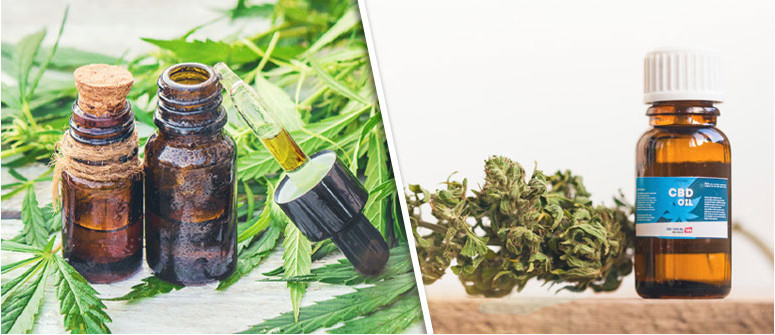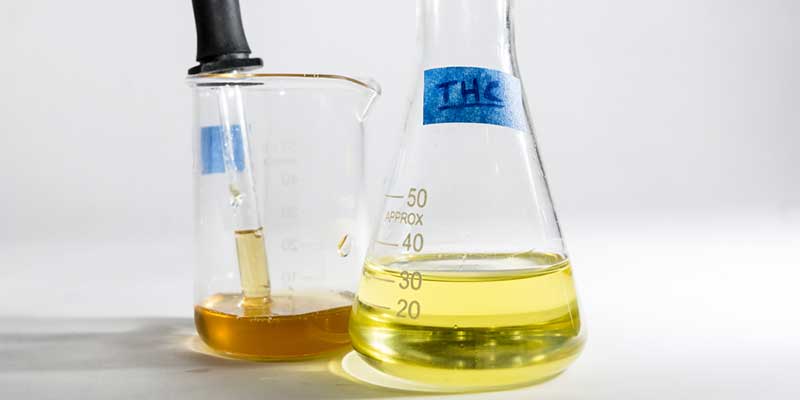The difference between cbd oil and cannabis oil

Learn the differences between CBD oil and cannabis oil. One is non-psychotropic. One is high in THC. Both demonstrate significant therapeutic promise.
When researching cannabis, it quickly becomes apparent that it’s a complex plant. The herb is loaded with a vast array of molecules that all provide different effects. The plant produces a unique family of chemicals known as cannabinoids. Over 100 have been identified, and most that have been studied display medicinal potential. The two primary cannabinoids found in most types of cannabis are THC—the psychotropic molecule that produces a high—and CBD, a non-psychotropic molecule associated with numerous health benefits.
With the modern market boasting products with names like “CBD oil” and “cannabis oil,” what is the actual difference between the two? To start, let’s provide a little background info.
CBD IS FROM CANNABIS, BUT CANNABIS IS NOT CBD
Cannabis is almost always associated with the high produced by THC-rich derivatives of the plant. This cannabinoid binds to CB1 receptors in the central nervous system, inducing a windfall of psychological and physiological outcomes. In contrast, CBD does not bind to this site, and instead takes a more indirect route.
To benefit from CBD—without the high induced by THC—the cannabinoid can be extracted from the cannabis plant and concentrated on its own. However, marijuana strains produced for the recreational market usually don’t contain enough CBD to make this process worthwhile, so industrial hemp is used instead. This is a type of cannabis bred to contain negligible levels of THC and high levels of CBD. This also makes hemp-derived CBD products legal throughout Europe, North America, and many other parts of the world.
On the other hand, recreational cannabis plants can be used to create an extract rich in THC and CBD; however, the resulting product is considered cannabis oil, not CBD oil.
Let’s break it down further.
WHAT IS CBD OIL?

What sets CBD oil apart from cannabis oil is the THC content. CBD oil is derived primarily from regulated industrial hemp, and therefore contains only trace amounts of THC (under 0.3% in the United States). These minute quantities of the psychotropic molecule ensure that taking CBD oil, even in large amounts, will not get you high.
CBD products can now be found almost everywhere, including health food shops and some supermarkets. This is because CBD is legal in many Western markets due to its good safety profile and lack of mind-altering qualities. This legality, which begets breakthroughs in scientific research, is the reason CBD has become such a widespread phenomenon.
WHY USE CBD OIL?
Studies have found CBD to possess anti-inflammatory, antioxidant, neuroprotective, and antiseizure effects, among others.
The cannabinoid is thought to achieve these effects through multiple mechanisms. CBD interacts with the endocannabinoid system, a modulatory system in the body that influences many physiological functions, including appetite, mood, metabolism, and immunity.
CBD oil is used by some in an attempt to tame the symptoms of inflammatory conditions like Crohn’s disease and other disorders that involve intestinal inflammation. Research has shown that CBD has the potential to treat inflammatory bowel diseases.
Athletes and active individuals are also turning to CBD oil to help reduce inflammation and muscle soreness following bouts of exercise.
Anxiety and mood are also on the long list of conditions that CBD oil might be able to assist with. The cannabinoid exerts broad therapeutic properties by acting upon the central nervous system. Evidence also suggests CBD might be beneficial in cases of OCD and PTSD. Because CBD oil is non-psychotropic, it allows users to dose throughout the day without any mental obstruction.
Most high-quality commercial CBD oils are full spectrum formulas. This means they contain other molecules from the hemp plant such as terpenes, which have their own therapeutic properties. Terpenes have been shown to work in synergy with CBD and may enhance some of the molecule’s medicinal actions. This synergistic mechanism is known as the entourage effect.
DIFFERENT TYPES OF CBD OIL
CBD oils on the market can be divided into two major categories: crude vs. purified. Products available in a crude form appear green-brown in color. These extracts contain CBD and terpenes, but also include chlorophyll, waxes, and lipids, which reduces the concentration of CBD within each dose and results in an uneven liquid consistency.
The second category is purified, “golden” CBD oil. This difference in color is due to a process known as winterization, which removes chlorophyll, waxes, and lipids, leaving behind a shimmering final product.
WHAT IS CANNABIS OIL?

Cannabis oil is made from cannabis strains high in THC. This essentially means any cannabis strain that has a THC level capable of causing a mind-altering effect. Although cannabis oil may also contain high levels of CBD in some cases, if it contains more THC than the legal threshold of 0.3%, or if it’s derived from recreational cannabis strains, it’s not CBD oil.
Cannabis oil is illegal in many countries, including most European nations. The presence of THC renders cannabis oil an illicit substance in the eyes of the law, and production and possession are criminal offences.
WHY USE CANNABIS OIL?
Despite what the law says, science paints a very different picture. Sure, cannabis oil is psychotropic, but THC does offer some very real medicinal properties. This is the reason why some regions, including many states in the US, are legalizing and decriminalizing THC. Some users prefer cannabis oil to treat symptoms precisely because of the psychotropic effect. The high can provide a powerful remedy to low mood, insomnia, and stress for some people.
THC also exerts anti-nausea effects and can increase appetite, making it extremely helpful for people experiencing side effects from medications such as chemotherapy. The cannabinoid can reduce pain to a degree, yet interestingly works more effectively when co-administered with CBD.
DIFFERENT TYPES OF CANNABIS OIL
Depending on where you live, cannabis oil is hard to come across. Many users make their own version at home using alcohol or oil-based extraction methods. These formulas may be high in THC and CBD, or just high in THC. They can also retain some of the terpenes and other molecules, although not as effectively as commercial methods like CO₂ extraction. One major problem with home-extraction is quantification. Users rarely have the chance to analyze the exact quantities and contents of their oil, whereas many high-quality CBD oils are subject to laboratory testing.
CBD OIL VS. CANNABIS OIL—THE BOTTOM LINE
The high induced by cannabis oil makes it difficult to conduct daily activities as usual. This is where CBD oil is more advantageous for people looking to include cannabinoids in their supplement regimen. In this way, CBD oil can address many of the same issues as cannabis oil, without interrupting psychological function. Cibdol CBD oil harnesses the "Swiss approach" to purity, starting with organic hemp and ending with third-party testing to verify the contents of every batch. Regardless of what exactly you’re looking for, you’ll now be informed as you browse the sea of CBD products at your disposal.
.jpg)
.jpg)

.jpg)
